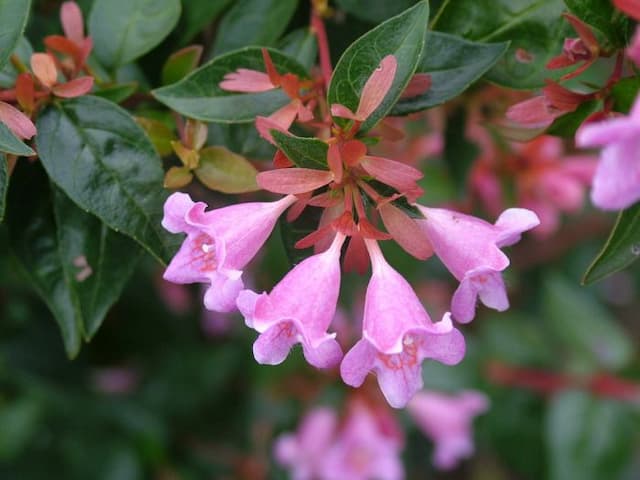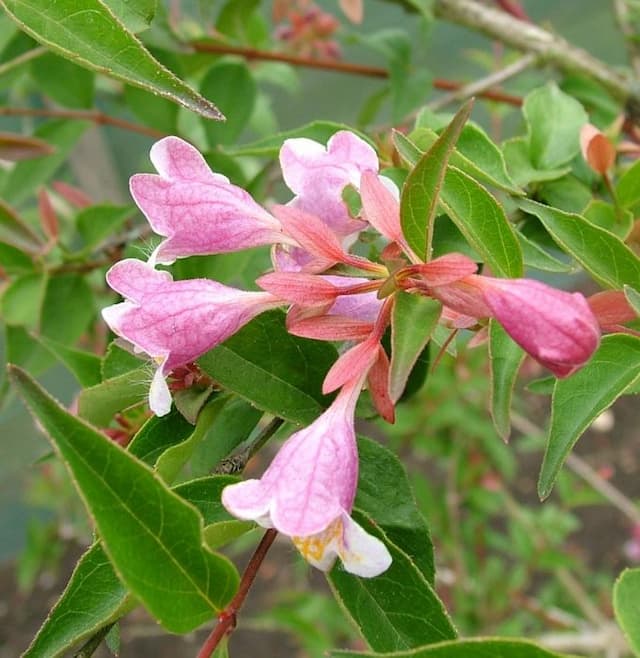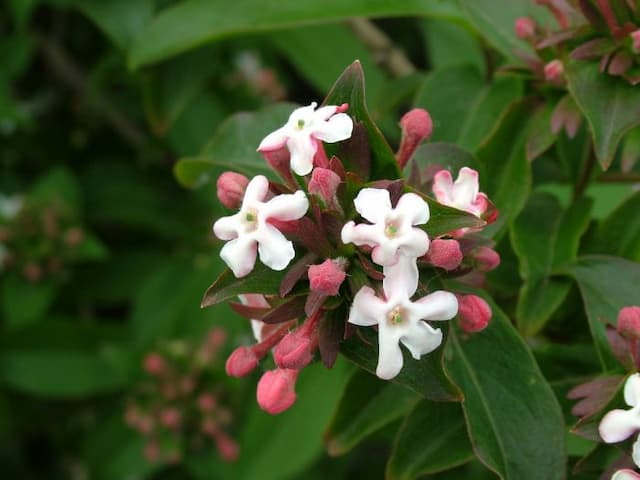Red Prince Weigela Weigela 'Red Prince'

ABOUT
Weigela 'Red Prince' is a flowering deciduous shrub that boasts a profusion of trumpet-shaped flowers with a rich red hue that tend to attract hummingbirds and butterflies. These vibrant blooms have a slightly corrugated texture and emerge radiantly against the backdrop of the plant's lush green foliage. The leaves themselves are oval to oblong, with a soft, matte surface and finely toothed edges. The overall growth habit of the Weigela 'Red Prince' is gracefully rounded, giving it a compact and bushy appearance. This plant is favoured for its repeat blooming capability, which means that under ideal conditions it may delight with multiple blooming periods throughout the growing season. The striking red flowers, paired with the verdant green leaves, make this shrub a popular choice for gardeners looking to add a splash of bold color to their landscape.
About this plant
 Names
NamesFamily
Caprifoliaceae.
Synonyms
Red Prince Weigela, Red Prince.
Common names
Weigela 'Red Prince'
 Toxicity
ToxicityTo humans
The Weigela is not known to be toxic to humans. There are no reported symptoms of poisoning from ingestion because it is generally considered non-poisonous. However, as with any plant, individual allergies or sensitivities may exist, and it is always advisable to avoid consuming parts of ornamental plants.
To pets
The Weigela is not known to be toxic to pets. It is considered non-toxic to dogs, cats, and other animals, and there are no significant symptoms associated with the ingestion of this plant. However, ingestion of large amounts of plant material can potentially cause gastrointestinal upset in some pets due to the mere physical irritation of plant matter, not because of toxicity.
 Characteristics
CharacteristicsLife cycle
Perennials
Foliage type
Deciduous
Color of leaves
Green
Flower color
Red
Height
5 feet (1.5 meters)
Spread
5 feet (1.5 meters)
Plant type
Shrub
Hardiness zones
4
Native area
Asia
Benefits
 General Benefits
General Benefits- Attractive Flowers: Weigela 'Red Prince' produces deep red trumpet-shaped flowers that add striking color to the landscape.
- Long Bloom Period: This plant has a long flowering season, often blooming from late spring to early summer.
- Habitat for Wildlife: The blossoms attract hummingbirds and butterflies, providing a source of nectar for these pollinators.
- Easy to Grow: It is known for being low maintenance and easy to care for, which is ideal for both experienced and novice gardeners.
- Drought Tolerant: Once established, Weigela 'Red Prince' can tolerate periods of drought, making it suitable for various climates and less demanding on water resources.
- Pruning Tolerance: It responds well to pruning, allowing gardeners to easily shape the plant and maintain a desired size or form.
- Decorative Foliage: The foliage of Weigela 'Red Prince' is also attractive, with green leaves that can add texture to a garden setting.
- Versatility in Landscape: It can be used in a variety of landscape applications, including borders, hedges, and as a specimen plant.
- Seasonal Interest: Beyond its bloom time, Weigela 'Red Prince' can provide structure and interest throughout the year, enhancing the garden's seasonal appeal.
- Resistant to Pests: This plant has good resistance to many common pests, reducing the need for chemical treatments in the garden.
 Medical Properties
Medical PropertiesThis plant is not used for medical purposes.
 Air-purifying Qualities
Air-purifying QualitiesThis plant is not specifically known for air purifying qualities.
 Other Uses
Other Uses- Weigela 'Red Prince' can be used in bonsai culture. Due to its attractive foliage and flowers, enthusiasts may prune and shape this shrub into a miniature form, adhering to bonsai artistry techniques.
- The shrub's dense branching habit provides shelter for small animals and birds, making it an excellent choice for wildlife gardens intending to offer refuge to fauna.
- Cut branches of Weigela 'Red Prince' are used in floral arrangements, as their vibrant red flowers add color and structure to bouquets and decorative displays.
- This plant can serve as a natural fence or screen when planted in a row, creating privacy for yards and outdoor living spaces with its lush growth.
- Weigela 'Red Prince' is often used as a backdrop for perennial beds, where its upright form and spring to summer flowers provide a consistent visual backdrop for other blooming plants.
- Photographers and artists may use Weigela 'Red Prince' as a subject or background for artistic projects due to its showy flowers and attractive foliage texture.
- Teachers and educators might use the plant to explain pollinator attraction strategies, as its flowers are known to attract bees, butterflies, and hummingbirds.
- The shrub's woody stems can be used to create rustic garden stakes and supports for other, more delicate or climbing plants in the garden.
- Garden designers may utilize Weigela 'Red Prince' as a color contrast plant, positioning it next to yellow or light pink flowering plants for vibrant visual impact.
- Sustainable gardening practices may involve the use of Weigela 'Red Prince' clippings as organic mulch, which decompose over time to enrich the soil.
Interesting Facts
 Feng Shui
Feng ShuiWeigela is not used in Feng Shui practice.
 Zodiac Sign Compitability
Zodiac Sign CompitabilityWeigela is not used in astrology practice.
 Plant Symbolism
Plant Symbolism- Resilience – The Weigela 'Red Prince' is known for being hardy and tough, able to withstand less-than-ideal conditions, symbolizing the ability to endure and thrive in adversity.
- Abundance – This plant produces a profusion of red trumpet-shaped flowers which can symbolize the idea of lavishness and generosity.
- Attraction – With its bright red flowers, the Weigela 'Red Prince' is attractive to hummingbirds and bees, symbolizing magnetism and the power to draw others in.
- Protection – Weigela shrubs can be used in hedges or as border plants, symbolizing boundaries and the concept of safeguarding what is valuable.
- Renewal – The Weigela 'Red Prince' goes through a period of dormancy in the winter and blooms afresh in the spring, representing rebirth and new beginnings.
 Water
WaterThe Weigela 'Red Prince' should be watered deeply to ensure that the water reaches the roots, but it should not be waterlogged. It's best to water the plant weekly with about 1 inch of water during its growing season, more frequently during hot, dry periods, and reduce watering in the fall as the plant goes dormant. You may need to provide approximately 1.5 gallons of water per week depending on soil conditions and climate. It’s important to avoid overhead watering to prevent fungal diseases; instead, use a soaker hose or drip irrigation to deliver water directly to the base of the plant.
 Light
LightWeigela 'Red Prince' thrives in full sun but can tolerate partial shade. For best flowering, plant it in a spot that receives at least 6 hours of direct sunlight daily. Avoid deep shade, as this can reduce blooming and weaken the plant over time.
 Temperature
TemperatureWeigela 'Red Prince' is hardy in a wide range of temperatures and can survive winter lows down to -30°F. Its ideal growing temperatures are between 50°F and 75°F. During the hot summer months, the plant tolerates temperatures well above this range without significant stress.
 Pruning
PruningPrune the Weigela 'Red Prince' after it finishes blooming in late spring to early summer to maintain its shape and encourage bushier growth. Pruning is also necessary to remove any dead or broken branches and to rejuvenate older plants. Prune about one-third of the oldest stems down to the ground each year.
 Cleaning
CleaningAs needed
 Soil
SoilThe Weigela 'Red Prince' thrives in a well-draining loamy soil that is rich in organic matter. The ideal pH for this plant is slightly acidic to neutral, ranging from 5.5 to 7.0. To create the best soil mix, combine two parts garden soil, one part peat moss or compost, and one part perlite or sand to ensure proper drainage and aeration. Regularly adding organic mulch will also benefit the plant by retaining moisture and providing nutrients as it decomposes.
 Repotting
RepottingThe Red Prince Weigela does not need to be repotted frequently as it is commonly grown outdoors. For container-grown plants, repotting every 3 to 5 years, or when root bound, is adequate. Choose a slightly larger pot and fresh soil mix to replace the old mix and provide new nutrients for continued growth.
 Humidity & Misting
Humidity & MistingThe Red Prince Weigela is adaptable to a wide range of humidity levels and does not have specific humidity requirements. It grows well in the natural outdoor humidity levels found in its hardiness zones. Ensure good air circulation around the plant to prevent any potential humidity-related issues.
 Suitable locations
Suitable locationsIndoor
Weigela 'Red Prince' is generally not suited for indoor growth.
Outdoor
Plant in full sun to part shade, water regularly, and prune as needed.
Hardiness zone
4-8 USDA
 Life cycle
Life cycleThe Red Prince Weigela begins its life cycle as a dormant seed, which upon germination in early spring, grows into a small seedling. As temperatures warm, the seedling establishes a root system and develops into a young plant with foliage. Between late spring and early summer, the mature Red Prince Weigela reaches its flowering stage, showcasing trumpet-shaped, red flowers that attract pollinators. Post-blooming, the plant enters a growth phase where it focuses energy on expanding its woody structure and foliage throughout the summer. As autumn approaches, the plant prepares for dormancy, shedding leaves if deciduous, and slowing down growth as temperatures drop. During winter, the Red Prince Weigela remains dormant, storing energy to repeat the life cycle again with the return of spring.
 Propogation
PropogationPropogation time
Spring-Early Summer
The Weigela 'Red Prince', a popular ornamental shrub known for its bright red flowers, is most commonly propagated through softwood cuttings. This method is typically done in late spring or early summer when the plant's new growth is just beginning to harden but is still flexible. Gardeners should select a healthy stem that has no flowers or buds, cut a 4 to 6-inch (10 to 15 cm) length, and remove leaves from the lower half of the cutting. Dipping the cut end in rooting hormone helps to encourage root development. The cutting should then be planted in a well-draining rooting medium such as potting soil mixed with sand or perlite, ensuring at least two sets of leaf nodes are below the surface. To maintain humidity, a plastic bag or cover can be placed over the cutting, but it should be removed once new growth indicates rooting has occurred. Regular misting and keeping the soil consistently moist but not soggy will provide the optimal conditions for root formation.








![Himalayan honeysuckle [Golden Lanterns]](/_next/image?url=https%3A%2F%2Fplants-admin.emdemapps.com%2Fimages%2Fplants%2F%2Fimages%2F604b55302cc87.png&w=640&q=75)
